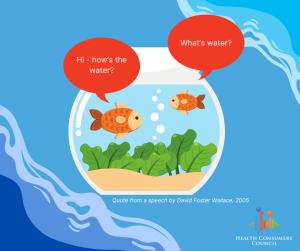This year – 2024 – is going to be a big year in politics.
If you haven’t started to see more of your local state politicians and candidates in your social media or in your letterbox yet, you soon will. In March 2025, WA will hold its next State General Election.
And if that’s not enough politics for you – don’t fear, there will be a Federal election at some point in 2025, so we’ll also see more of our Federal politicians and candidates this year.
Why does this matter to Health Consumers’ Council, our members and consumers?
It matters because of what makes a difference to our health.
When we think of health, many people think of going to the doctor, or even the hospital. Estimates vary, but some studies suggest that medical care accounts for less than 20% of health outcomes[1].
It’s clear our health and wellbeing is about so much more than medical care.
The things that happen to and around us, and the conditions in which we are born, grow, work and live, are just some of the things that shape our lives and health. Both at an individual level, and a community level. These things are called the social determinants of health, and according to the World Health Organisation, they account for between 30% and 55% of health outcomes – which is a bigger impact than healthcare or lifestyle choices.
Fish don’t know that they’re swimming in water – the social determinants of health are our water.
Addressing these social and societal impacts is vital for improving health and wellbeing and addressing long standing inequities in health. That’s why you’ll see HCC talking about things like racism, stigma, housing, poverty, the effects of loneliness and isolation, early childhood trauma, raising the rate of income support, and climate change – all things that, when improved, contribute to creating a more equitable and resilient community and positive impact on our health and wellbeing.
That’s also why, as an organisation focused on health and wellbeing, we talk about things like Australia Day, The Voice referendum, Black Lives Matter, LGBTIQA+ Pride, and Disability Pride.
We subscribe to the idea that “Health is a state of complete physical, mental and social well-being, and not merely the absence of disease or infirmity”[2].
This means that addressing inequity in health means addressing the impact of trauma, and issues from the past, and how they affect people in the present. It’s about recognising how respect and listening plays a role in people’s welfare. And it’s about the ongoing impacts of racism and stigma – on an individual level, in culture, and in many cases on a systemic and institutional level, across politics, law, social practices, health systems and justice systems.
One of our objectives is to “provide advocacy for consumers experiencing problems with the health system, particularly the vulnerable and/or disadvantaged”[3]. To do this properly, we need to engage with, and do our best to influence, decision-makers and people in positions of power. To some, that is the definition of politics.
Concepts of disadvantage – like racism, stigma and poverty – may only seem political if they don’t affect us personally. For those who are disadvantaged by the way we’ve structured society, “the personal is political”[4].
To meet our responsibility to the WA community, and work towards our vision of equitable person-centred healthcare, we will continue to create opportunities for the lived experiences of consumers, carers, family members and community members to engage with, and influence, decisions that affect our health and wellbeing – both within healthcare and beyond.
We will be sharing more about our plans to provide opportunities for members and stakeholders to engage and influence state and federal politicians and candidates in 2024 and 2025 – it’s a big time for health and social care and we must have our voices front and centre in these discussions.
For the good of the WA community.
Clare Mullen, Executive Director, February 2024
[1] https://www.ncbi.nlm.nih.gov/pmc/articles/PMC3863696/
[2] Constitution of the World Health Organisation, 1946
[3] HCC Rules
[4] https://www.britannica.com/topic/the-personal-is-political





